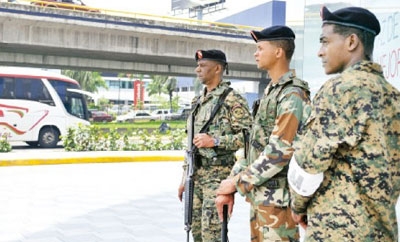The Dominican military has begun patrolling the streets alongside the country’s police force in an effort to reduce high crime levels, a move sure to feed concerns over the blending of military-police roles in the region.
Following orders from President Danilo Medina, more than 1,400 armed soldiers were deployed to Santo Domingo’s busiest neighborhoods, as well the areas with the highest crime rates, as the Miami Herald reports. According to police, the deployment led to an almost immediate drop in the number of crimes.
Some residents were happy with the decision, with one person quoted by the Miami Herald as saying that crime levels had reached a critical level and that “the police alone are not enough.” However, civil groups have expressed concern that an increased military presence could lead to a rise in human rights abuses.
The government justified the patrol, saying that the strategy had worked in other countries, and expressed plans to increase the number of soldiers incorporated in the patrol to 5,000.
InSight Crime Analysis
The homicide rate in the Dominican Republic has nearly doubled in the past two decades, standing at 25 per 100,000 residents in 2011. Street crime is also a major problem, with more than14,000 thefts and armed robberies reported last year.
It is unclear to what degree this rise in insecurity is linked to the transnational drug trade. The Dominican Republic has become an increasingly important transit nation for cocaine shipments, as highlighted by the high rate of cocaine seizures seen so far in 2013. The country has also seen an increased number of citizens deported from the US on drug charges, which may have fed the growth of local criminal structures.
The militarization of crime fighting, a phenomenon seen in various countries across Latin America, has been criticized for facilitating human rights abuses by putting the military in a policing role. One reason why countries like Mexico and Guatemala have relied on militarization is to compensate for a corrupt and inept police force. This likely prompted the Dominican Republic to resort to the same measures, as the country’s police force is also viewed as badly trained and untrustworthy. In 2012, 290 people were killed by police, while seven percent of armed robberies and thefts were attributed to police or people in police uniform.

